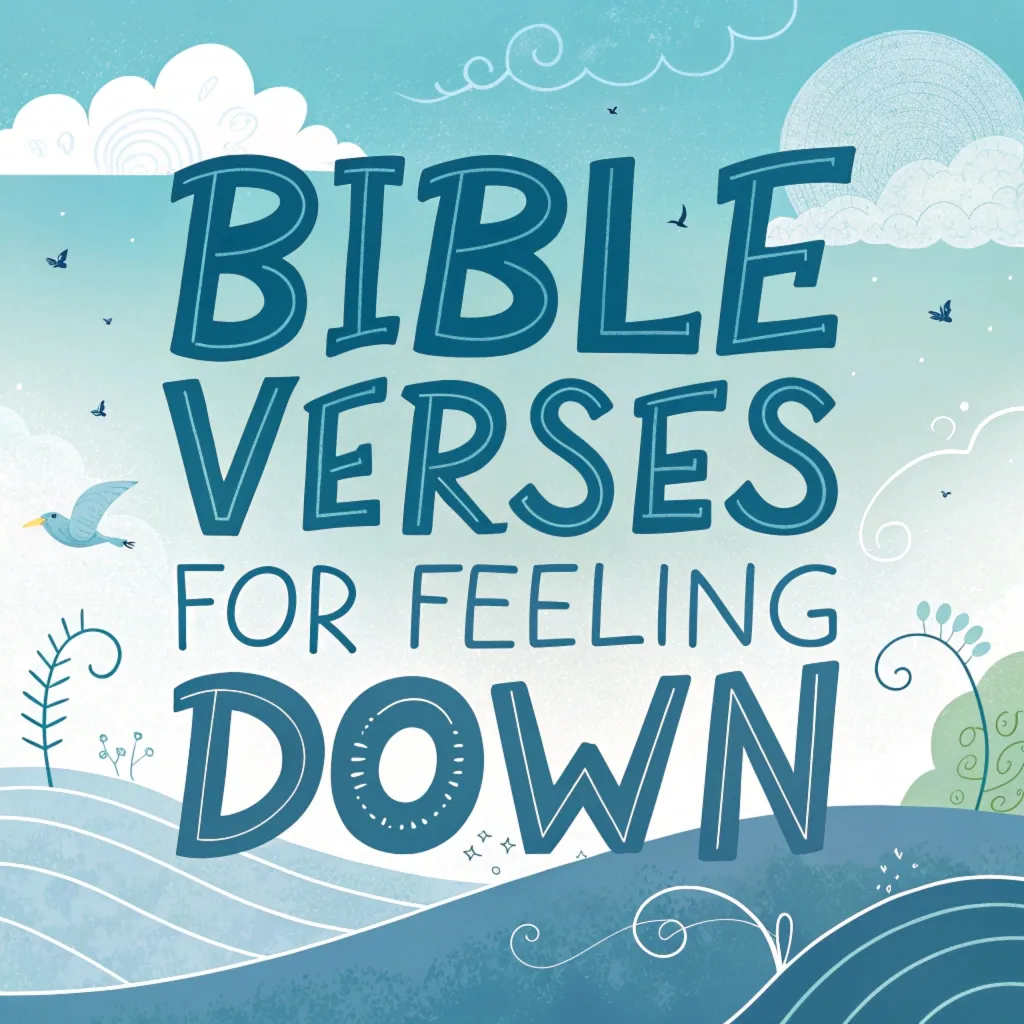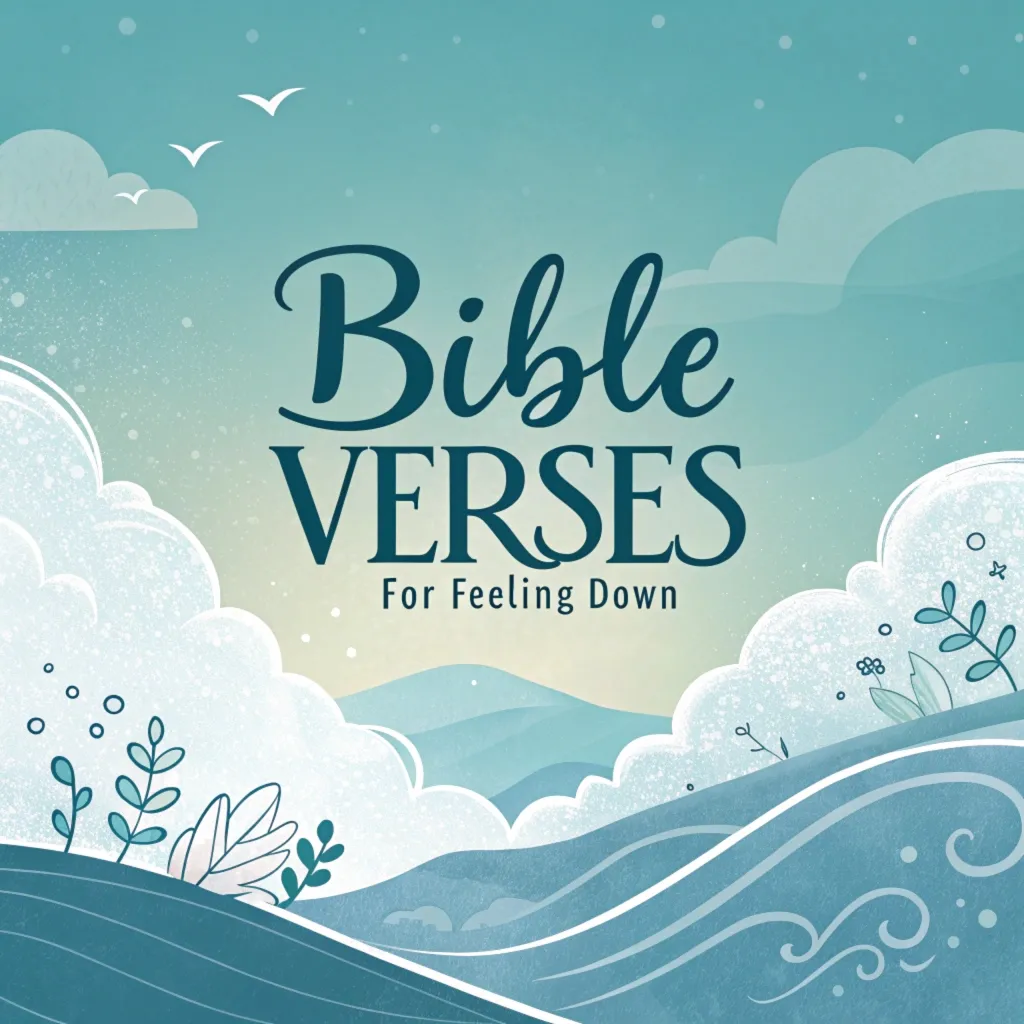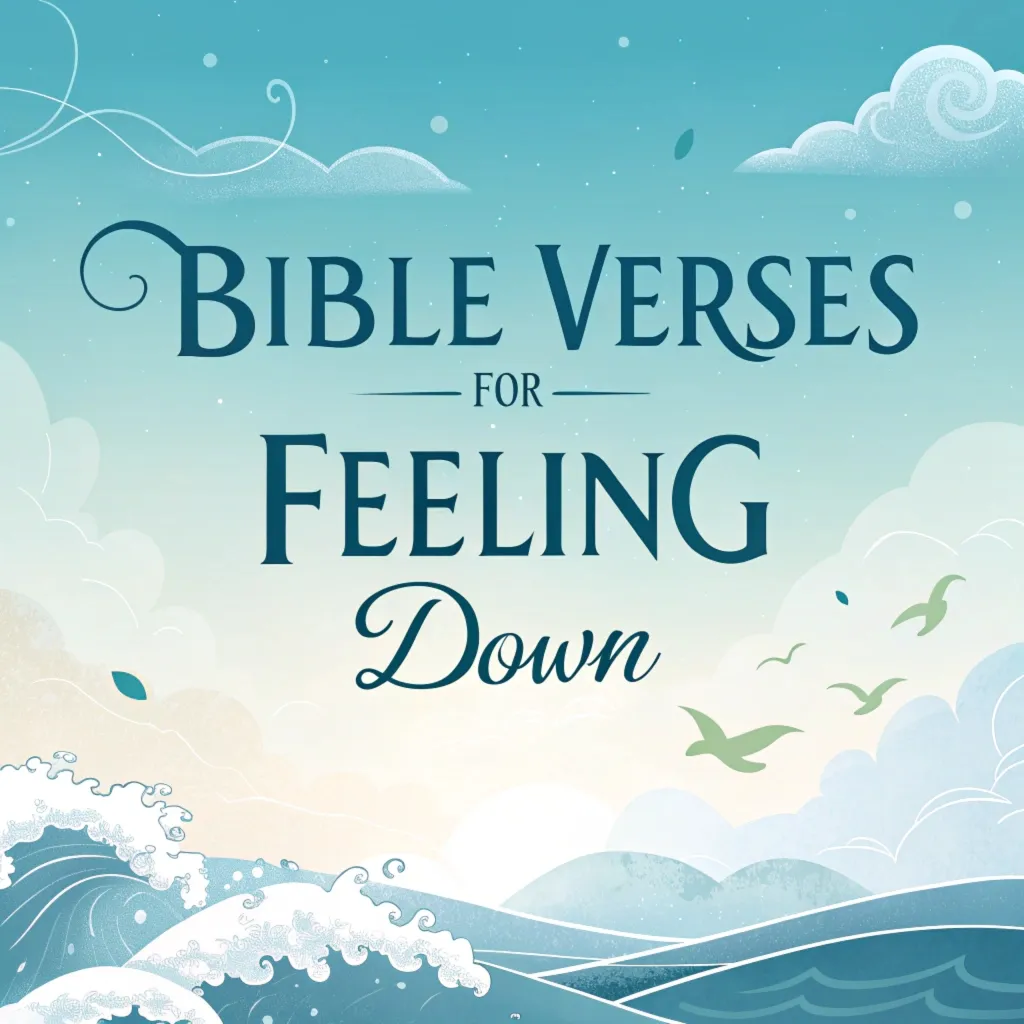13 Bible Verses For Feeling Down: Overcome Feelings of Sadness
Feeling down can be a challenging experience, but the Bible offers words of comfort and hope to lift our spirits.
This post explores 13 powerful Bible verses that provide encouragement and strength during difficult times.
These verses remind us of God’s love, presence, and support, offering a source of solace and renewal for those struggling with sadness or depression.

Key Takeaways
- God’s presence: Several verses emphasize that God is always with us, even in our darkest moments.
- Strength in weakness: The Bible reminds us that God’s power is made perfect in our weakness.
- Hope for the future: Many verses offer hope and assurance of better days ahead.
- Peace amid turmoil: Scripture provides comfort and peace that surpasses understanding.
- Overcoming fear: The Bible encourages us to be strong and courageous, knowing God is by our side.
- Casting anxieties: We are reminded to give our worries and fears to God.
- Renewal and restoration: Several verses speak of God’s ability to renew our strength and restore our joy.
- God’s unfailing love: The Bible consistently emphasizes God’s unconditional love for us.
- Comfort in suffering: Scripture acknowledges our pain while offering divine comfort.
- Trust in God’s plan: We are encouraged to trust in God’s greater purpose, even when we can’t see it.
The power of Scripture in times of sadness and depression cannot be overstated. These verses serve as a beacon of hope, guiding us through the darkest moments of our lives.
They remind us that we are never alone in our struggles and that God’s love and support are unwavering and eternal.
By turning to these verses, we can find comfort, strength, and renewed purpose. They offer a perspective that transcends our immediate circumstances, helping us to focus on God’s promises and His ultimate plan for our lives.
Deuteronomy 31:8 – God’s Constant Presence
The Bible offers comfort in times of sadness with the assurance of God’s constant presence. Deuteronomy 31:8 states, “The Lord himself goes before you and will be with you; He will never leave you nor forsake you. Do not be afraid; do not be discouraged.”
This verse reminds us that we are never alone in our struggles. God is always with us, leading the way and providing support.
When feeling down, we can find solace in knowing that the Creator of the universe is by our side, ready to offer strength and guidance.
God’s presence is a powerful antidote to the isolation often felt during periods of sadness or depression. This verse reassures us that even in our darkest moments, we are not abandoned.
The Lord goes before us, preparing the way and guiding our steps. His promise to never leave or forsake us provides a solid foundation for hope and courage.
When we feel discouraged, we can draw strength from the knowledge that God is actively involved in our lives. His presence is not passive but dynamic, offering continuous support and guidance.
Philippians 4:13 – Strength Through Christ

When sadness overwhelms us, Philippians 4:13 offers a powerful reminder of our inner strength: “I can do all things through Christ who strengthens me.”
This verse encourages us to look beyond our own limitations and tap into the divine strength available to us. It suggests that no challenge is too great when we rely on Christ’s power.
By focusing on this truth, we can find the courage to face our difficulties and overcome feelings of helplessness or despair.
Christ’s strength becomes our strength when we place our trust in Him. This verse reminds us that our capabilities are not limited to our own resources but are expanded infinitely through our connection with Christ.
It encourages us to face our challenges with confidence, knowing that we have access to a power greater than ourselves.
This promise of strength through Christ can be particularly comforting when depression saps our energy and motivation. It reminds us that we are not alone in our struggles and that with Christ, we can find the strength to persevere.
Isaiah 41:10 – God’s Supportive Presence
Isaiah 41:10 provides reassurance in times of fear and discouragement: “So do not fear, for I am with you; do not be dismayed, for I am your God. I will strengthen you and help you; I will uphold you with my righteous right hand.”
This verse paints a vivid picture of God’s supportive presence. It reminds us that we don’t have to face our challenges alone.
God promises to strengthen us, help us, and hold us up. When feeling down, we can draw comfort from the image of God’s righteous hand supporting us through our struggles.
God’s promise of support in this verse is comprehensive and powerful. He addresses our fears directly, offering His presence as the antidote.
The imagery of God’s righteous right hand upholding us conveys a sense of security and stability, even in the midst of turmoil.
This verse encourages us to lean on God’s strength when our own fails. It reminds us that with God’s help, we can face and overcome the challenges that seem insurmountable.
Psalm 34:17-18 – God’s Attention to the Brokenhearted

For those feeling crushed by sadness, Psalm 34:17-18 offers hope: “The righteous cry out, and the Lord hears them; he delivers them from all their troubles. The Lord is close to the brokenhearted and saves those who are crushed in spirit.”
This passage assures us that God hears our cries and is attentive to our pain.
It emphasizes God’s closeness to those who are hurting, offering the promise of deliverance from troubles. When we feel broken or crushed, we can find comfort in knowing that God is near and ready to save us.
God’s attentiveness to our pain is a powerful source of comfort. This verse assures us that our cries do not go unheard or unnoticed.
The Lord’s closeness to the brokenhearted is a tender reminder of His compassion and care for those who are suffering.
The promise of deliverance in this passage offers hope for those feeling overwhelmed by their troubles. It reminds us that our current state of brokenness is not permanent and that God is actively working to bring about our restoration.
Romans 8:38-39 – God’s Unshakeable Love
Romans 8:38-39 reminds us of the unshakeable nature of God’s love: “For I am convinced that neither death nor life, neither angels nor demons, neither the present nor the future, nor any powers, neither height nor depth, nor anything else in all creation, will be able to separate us from the love of God that is in Christ Jesus our Lord.”
This powerful declaration assures us that no circumstance, no matter how difficult, can separate us from God’s love. When feeling down, we can cling to the truth that we are eternally and unconditionally loved by God.
God’s love is presented here as an unbreakable force, stronger than any challenge or obstacle we might face. This comprehensive list of potential separators emphasizes the all-encompassing nature of God’s love, covering every possible scenario we might encounter.
For those struggling with depression, this verse offers the comforting assurance that even in our darkest moments, we remain firmly within the embrace of God’s love. It provides a solid foundation of security and belonging, regardless of our circumstances or emotional state.
Matthew 11:28-30 – Jesus’ Invitation to Rest
Jesus extends a comforting invitation in Matthew 11:28-30: “Come to me, all you who are weary and burdened, and I will give you rest. Take my yoke upon you and learn from me, for I am gentle and humble in heart, and you will find rest for your souls. For my yoke is easy and my burden is light.”
This passage offers solace to those feeling overwhelmed by life’s challenges. It reminds us that we can bring our burdens to Jesus and find rest for our souls. When sadness weighs us down, we can turn to Christ for gentle guidance and relief.
Jesus’ invitation to rest is particularly poignant for those struggling with depression or sadness. It acknowledges the weariness that often accompanies these emotional states and offers a compassionate response. The promise of rest for our souls speaks to a deep, inner renewal that goes beyond mere physical relaxation.
The imagery of taking on Jesus’ yoke suggests a partnership with Him in carrying our burdens. It implies that while our challenges may not disappear, we don’t have to face them alone. Jesus offers to share the load, making it more manageable.
Psalm 23:4 – God’s Comfort in Dark Times
The familiar words of Psalm 23:4 bring comfort in times of darkness: “Even though I walk through the darkest valley, I will fear no evil, for you are with me; your rod and your staff, they comfort me.”
This verse acknowledges that we may go through difficult periods in life, symbolized by the “darkest valley.”
However, it reassures us that we need not fear because God is with us. The imagery of God’s rod and staff suggests protection and guidance, offering comfort even in our most challenging moments.
The dark valley in this verse can be seen as a metaphor for periods of depression or profound sadness. It acknowledges the reality of these difficult times while offering the comforting assurance of God’s presence.
The promise that we need not fear evil, even in the darkest circumstances, is a powerful source of courage and hope.
God’s rod and staff, symbols of His protection and guidance, remind us that we are not left to navigate these dark times alone. Even when we can’t see the way forward, we can trust in God’s leading and care.
2 Corinthians 1:3-4 – God’s Comfort and Our Ability to Comfort Others
2 Corinthians 1:3-4 reveals a profound purpose in our struggles: “Praise be to the God and Father of our Lord Jesus Christ, the Father of compassion and the God of all comfort, who comforts us in all our troubles, so that we can comfort those in any trouble with the comfort we ourselves receive from God.”
This passage reminds us that the comfort we receive from God equips us to comfort others. It suggests that our experiences of sadness and God’s comfort can become a source of help for others facing similar challenges.
The cycle of comfort described in this verse offers a redemptive perspective on our struggles with sadness or depression.
It suggests that our difficult experiences are not wasted but can be transformed into a means of helping others. This can provide a sense of purpose and meaning even in the midst of our pain.
Knowing that we can use our experiences to comfort others can be a source of hope and motivation.
It reminds us that our struggles have value and that we can make a positive difference in the lives of others who are hurting.
Jeremiah 29:11 – God’s Plans for Our Future
Jeremiah 29:11 offers hope for the future: “For I know the plans I have for you, declares the Lord, plans for welfare and not for evil, to give you a future and a hope.”
This verse reminds us that God has good plans for our lives, even when our current circumstances seem bleak. It encourages us to look beyond our present difficulties and trust in God’s promise of a hopeful future.
When feeling down, we can find comfort in knowing that our current situation is not the end of our story.
God’s plans for us, as described in this verse, are characterized by welfare, not harm. This assurance can be particularly comforting when depression or sadness makes it difficult to see any positive possibilities in our future.
The promise of hope and a future offers a lifeline to cling to during dark times.
This verse encourages us to trust in God’s bigger picture, even when we can’t see or understand it ourselves. It reminds us that our current feelings or circumstances don’t define our ultimate destiny.
Philippians 4:6-7 – Peace Through Prayer
Philippians 4:6-7 provides a practical approach to finding peace: “Do not be anxious about anything, but in every situation, by prayer and petition, with thanksgiving, present your requests to God. And the peace of God, which transcends all understanding, will guard your hearts and your minds in Christ Jesus.”
This passage encourages us to bring our concerns to God through prayer, coupled with thanksgiving.
It promises a peace that surpasses understanding, guarding our hearts and minds. When sadness or anxiety overwhelms us, we can turn to prayer as a source of comfort and peace.
Prayer is presented here as a powerful antidote to anxiety and worry, which often accompany depression. The instruction to pray “in every situation” reminds us that no concern is too small or too large to bring before God.
The addition of thanksgiving in our prayers can help shift our focus from our problems to God’s faithfulness.
The promise of peace that “transcends all understanding” offers hope for those times when our situation seems hopeless or incomprehensible.
This peace is described as a guard for our hearts and minds, suggesting a protective quality that can help shield us from overwhelming negative thoughts and emotions.
Psalm 30:5 – The Temporary Nature of Sorrow
Psalm 30:5 offers hope with the reminder: “For his anger lasts only a moment, but his favor lasts a lifetime; weeping may stay for the night, but rejoicing comes in the morning.” This verse beautifully illustrates the temporary nature of sorrow.
It compares our difficult times to a night of weeping, followed by the promise of joy in the morning. When feeling down, we can find comfort in knowing that our sadness is not permanent and that joy will return.
The contrast between the brevity of God’s anger and the endurance of His favor provides a hopeful perspective on our current struggles.
It reminds us that while difficult times may feel endless, they are actually temporary in the grand scheme of things. The imagery of night and morning offers a tangible metaphor for the cycle of sorrow and joy in our lives.
This verse encourages us to hold on to hope, even in our darkest moments. It assures us that joy is not just a possibility but a promise, as certain as the coming of dawn after a long night.
Isaiah 40:31 – Renewed Strength Through Hope in the Lord
Isaiah 40:31 promises renewed strength for those who hope in God: “But those who hope in the Lord will renew their strength. They will soar on wings like eagles; they will run and not grow weary, they will walk and not be faint.”
This verse offers a powerful image of renewed vigor and endurance for those who place their trust in God. It encourages us to look beyond our current feelings of weakness or despair and anticipate a time of renewed strength and energy.
The promise of renewed strength is particularly relevant for those struggling with the fatigue and lack of motivation often associated with depression.
The vivid imagery of soaring like eagles, running without weariness, and walking without faintness paints a picture of extraordinary vitality and resilience.
This verse encourages us to place our hope in the Lord, suggesting that this act of trust is key to experiencing renewal.
It reminds us that our own strength may fail, but God’s strength is limitless and available to us when we turn to Him.
1 Peter 5:7 – Casting Our Anxieties on God
1 Peter 5:7 invites us to release our worries to God: “Cast all your anxiety on him because he cares for you.” This simple yet profound verse reminds us of God’s deep care for us and encourages us to give our concerns to Him.
When feeling burdened by sadness or worry, we can find relief in the act of surrendering our anxieties to God, trusting in His care and provision.
The act of casting our anxieties on God implies a deliberate transfer of our burdens. It encourages us to actively release our worries rather than holding onto them.
This verse reminds us that we don’t have to carry the weight of our concerns alone; we can entrust them to a God who cares deeply for us.
For those struggling with depression or persistent sadness, this invitation to release anxieties can be a source of great relief. It reminds us that God is not distant or indifferent to our struggles but is intimately concerned with our well-being.
FAQs About Bible Verses for Feeling Down
How can reading Bible verses help when I’m feeling down?
Reading Bible verses can provide comfort, hope, and perspective when feeling down. These verses remind us of God’s love, presence, and promises, offering encouragement and strength. They can shift our focus from our current circumstances to God’s bigger picture, providing peace and renewed hope.
Are there specific Bible verses that are best for depression?
While different verses may resonate more with different individuals, some commonly recommended verses for depression include Philippians 4:13, Isaiah 41:10, and Psalm 34:17-18. These verses emphasize God’s strength, presence, and care for those who are struggling.
How often should I read these Bible verses when I’m feeling sad?
There’s no set rule for how often to read Bible verses. Some find comfort in reading them daily, while others turn to them in moments of particular difficulty. The key is to engage with the verses in a way that feels meaningful and supportive to you.
Can meditating on Bible verses really change my mood?
Yes, meditating on Bible verses can positively impact your mood. By focusing on uplifting truths and promises, you can shift your thoughts from negative patterns to more hopeful ones. This practice, combined with other healthy coping strategies, can contribute to improved emotional well-being.
How can I remember these verses when I need them most?
Consider writing your favorite verses on note cards to carry with you, setting them as phone wallpapers, or memorizing key phrases. You could also create a “comfort playlist” of audio recordings of these verses to listen to when needed.
Are there any Bible study resources specifically for dealing with sadness or depression?
Yes, many Bible study guides and devotionals focus on overcoming sadness and depression. Look for resources that combine Scripture with practical applications and reflections. Your local church or Christian bookstore may have recommendations.
How can I apply these Bible verses to my daily life when I’m struggling?
Try to internalize the messages of these verses by reflecting on how they apply to your situation. You might journal about them, discuss them with a trusted friend or counselor, or use them as a basis for prayer. Applying these truths in small, practical ways each day can help build resilience over time.

Samantha is the author of Inner Light Spirituality, where she shares insights and guidance to inspire others on their spiritual journeys. With a passion for exploring various spiritual traditions, Samantha aims to make spirituality accessible and relatable. Through her writing, she encourages readers to embrace their unique paths and find meaning in their experiences. When not writing, she enjoys meditating and connecting with nature.







